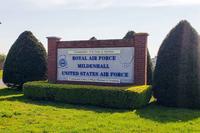Commissaries worldwide will soon start scanning all patron IDs and logging their household information when they go through checkout, commissary officials announced Oct. 31.
"In addition to verifying customers as authorized commissary patrons, we'll gain information that will give us a better understanding of our patrons, allowing the agency to provide the commissary benefit more effectively and efficiently," Joseph Jeu, director and CEO of the Defense Commissary Agency.
Fort Lee, Va., home to DeCA headquarters, started scanning IDs at checkout Oct. 22. The next phase of the rollout is scheduled to start Nov. 10 and all commissaries are expected to be participating by mid-January after the required software upgrade has been installed, officials said.
Commissary users out of uniform are currently asked to show their ID cards when they checkout as a way of ensuring they are authorized shoppers. Periodically some stores will also require patrons to show ID upon entrance, or, if they are not military ID card holders, receive a visitor pass. But the information on the ID cards is not currently collected or saved during any of those checks.
The commissary does already track some shopper data through the Commissary Rewards card system, which allows users to sign up for a card that can be loaded with electronic coupons. About one million cards were registered in the first year of that program, which launched August, 2012.
But with the new system officials will be able to track the information of all 5.3 million commissary eligible households.
Officials said the system will log the card ID number, rank, military status, branch of service, age, household size, and zip codes of residence and duty station of each shopper. It will not retain name, address, or phone number information, they said.
Patrons are required to input similar information when registering a Commissary Rewards card.
Army wife Jessica Dolley, whose ID was scanned as she shopped at the Fort Lee commissary Oct. 30, said the process went smoothly. The checker scanned her ID on the same scanner used for groceries before processing the rest of her purchase, she said. She said there have been signs up for weeks warning patrons about the upcoming change.
"It was very easy," she said. "They scanned it and started my order."
Although some commissary shoppers interviewed thought the program will collect too much of their personal data, many felt that commissary officials aren't planning to collect anything they haven't already given up.
"It's a government installation," said Sophia Ross, an Army wife at Fort Campbell, Ky. "If you didn't like them knowing all that information you shouldn't be married to the Army … How is it going to hurt you if they know how many people are in your home? It's not."
Michelle Farmer, also at Fort Campbell, agreed.
"I think who cares … it's basic info the government has access to in (the Defense Enrollment Eligibility Reporting System) anyway and it's not like personal sensitive info," she said.
Commissary supporters said that this program will help the commissary show its value.
"We applaud this step forward by the Defense Commissary Agency. The retail grocery industry is driven to a great extent by a retailers ability to understand the patron base, their core demographics and their preferences," said Patrick Nixon, the president of the American Logistics Association, which lobbies on behalf of the commissary. "This additional data will better position DeCA as it develops its marketing strategy for the 21st century commissary benefit. In addition, the breakout of the raw data on patron usage will go a long way in solidifying the value proposition of this important benefit to the military community."

























